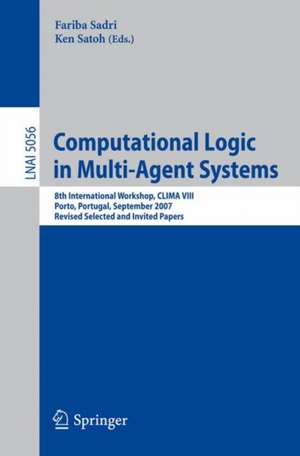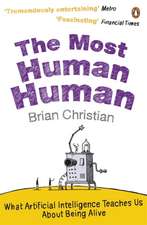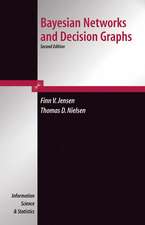Computational Logic in Multi-Agent Systems: 8th International Workshop, CLIMA VIII, Porto, Portugal, September 10-11, 2007. Revised Selected and Invited Papers: Lecture Notes in Computer Science, cartea 5056
Editat de Fariba Sadri, Ken Satohen Limba Engleză Paperback – 23 oct 2008
Din seria Lecture Notes in Computer Science
- 20%
 Preț: 1061.55 lei
Preț: 1061.55 lei - 20%
 Preț: 307.71 lei
Preț: 307.71 lei - 20%
 Preț: 438.69 lei
Preț: 438.69 lei - 20%
 Preț: 645.28 lei
Preț: 645.28 lei -
 Preț: 410.88 lei
Preț: 410.88 lei - 15%
 Preț: 580.46 lei
Preț: 580.46 lei - 17%
 Preț: 427.22 lei
Preț: 427.22 lei - 20%
 Preț: 596.46 lei
Preț: 596.46 lei -
 Preț: 449.57 lei
Preț: 449.57 lei - 20%
 Preț: 353.50 lei
Preț: 353.50 lei - 20%
 Preț: 1414.79 lei
Preț: 1414.79 lei - 20%
 Preț: 309.90 lei
Preț: 309.90 lei - 20%
 Preț: 583.40 lei
Preț: 583.40 lei - 20%
 Preț: 1075.26 lei
Preț: 1075.26 lei - 20%
 Preț: 310.26 lei
Preț: 310.26 lei - 20%
 Preț: 655.02 lei
Preț: 655.02 lei - 20%
 Preț: 580.93 lei
Preț: 580.93 lei - 20%
 Preț: 340.32 lei
Preț: 340.32 lei - 18%
 Preț: 938.83 lei
Preț: 938.83 lei - 20%
 Preț: 591.51 lei
Preț: 591.51 lei - 15%
 Preț: 438.59 lei
Preț: 438.59 lei - 20%
 Preț: 337.00 lei
Preț: 337.00 lei -
 Preț: 389.48 lei
Preț: 389.48 lei - 20%
 Preț: 607.39 lei
Preț: 607.39 lei - 20%
 Preț: 1024.44 lei
Preț: 1024.44 lei - 20%
 Preț: 579.30 lei
Preț: 579.30 lei - 20%
 Preț: 763.23 lei
Preț: 763.23 lei - 20%
 Preț: 453.32 lei
Preț: 453.32 lei - 20%
 Preț: 575.48 lei
Preț: 575.48 lei - 20%
 Preț: 585.88 lei
Preț: 585.88 lei - 20%
 Preț: 825.93 lei
Preț: 825.93 lei - 20%
 Preț: 763.23 lei
Preț: 763.23 lei - 17%
 Preț: 360.19 lei
Preț: 360.19 lei - 20%
 Preț: 1183.14 lei
Preț: 1183.14 lei - 20%
 Preț: 340.32 lei
Preț: 340.32 lei - 20%
 Preț: 504.57 lei
Preț: 504.57 lei - 20%
 Preț: 369.12 lei
Preț: 369.12 lei - 20%
 Preț: 583.40 lei
Preț: 583.40 lei - 20%
 Preț: 343.62 lei
Preț: 343.62 lei - 20%
 Preț: 350.21 lei
Preț: 350.21 lei - 20%
 Preț: 764.89 lei
Preț: 764.89 lei - 20%
 Preț: 583.40 lei
Preț: 583.40 lei - 20%
 Preț: 649.49 lei
Preț: 649.49 lei - 20%
 Preț: 341.95 lei
Preț: 341.95 lei - 20%
 Preț: 238.01 lei
Preț: 238.01 lei - 20%
 Preț: 538.29 lei
Preț: 538.29 lei
Preț: 334.38 lei
Preț vechi: 417.97 lei
-20% Nou
Puncte Express: 502
Preț estimativ în valută:
63.98€ • 66.80$ • 52.95£
63.98€ • 66.80$ • 52.95£
Carte tipărită la comandă
Livrare economică 05-19 aprilie
Preluare comenzi: 021 569.72.76
Specificații
ISBN-13: 9783540888321
ISBN-10: 3540888322
Pagini: 312
Ilustrații: X, 299 p.
Dimensiuni: 155 x 235 x 23 mm
Greutate: 0.47 kg
Ediția:2008
Editura: Springer Berlin, Heidelberg
Colecția Springer
Seriile Lecture Notes in Computer Science, Lecture Notes in Artificial Intelligence
Locul publicării:Berlin, Heidelberg, Germany
ISBN-10: 3540888322
Pagini: 312
Ilustrații: X, 299 p.
Dimensiuni: 155 x 235 x 23 mm
Greutate: 0.47 kg
Ediția:2008
Editura: Springer Berlin, Heidelberg
Colecția Springer
Seriile Lecture Notes in Computer Science, Lecture Notes in Artificial Intelligence
Locul publicării:Berlin, Heidelberg, Germany
Public țintă
ResearchCuprins
Invited Paper.- Plan-Coordination Mechanisms and the Price of Autonomy.- Regular Papers.- Actions with Failures in Interval Temporal Logic.- A Logic for Reasoning about Rational Agents.- Formal Modelling of Emotions in BDI Agents.- ‘What I Fail to Do Today, I Have to Do Tomorrow’: A Logical Study of the Propagation of Obligations.- Proof Theory for Distributed Knowledge.- EVOLP: Tranformation-Based Semantics.- Language Constructs for Multi-agent Programming.- -Tropos.- A Heuristic Approach to P2P Negotiation.- Towards Context Sensitive Defeasible Rules.- Fuzzy Argumentation for Trust.- Assumption-Based Argumentation for Selection and Composition of Services.- A Complete Quantified Epistemic Logic for Reasoning about Message Passing Systems.- Analytic Cut-Free Tableaux for Regular Modal Logics of Agent Beliefs.- System Description Paper.- EVOLP: An Implementation.
Textul de pe ultima copertă
This book constitutes the thoroughly refereed post-conference proceedings of the 8th International Workshop on Computational Logic for Multi-Agent Systems, CLIMA VIII, held in Porto, Portugal, in September 2007 - co-located with ICLP 2008, the International Conference on Logic Programming.
The 14 revised full technical papers and 1 system description paper presented together with 1 invited paper were carefully selected from 33 submissions and went through at least two rounds of reviewing and improvement. The regular papers address topics such as interdependencies and co-ordination of task-based planning in multi-agent systems, interval temporal logic, game theoretic concepts for reasoning about rational agents, proof theory for multi-agent epistemic logic, transformational semantics for evolving logic programs (EVOLP), programming languages based on BDI models, agent oriented early requirements engineering framework, heuristic algorithms for agent negotiation, as well as argumentation.
The 14 revised full technical papers and 1 system description paper presented together with 1 invited paper were carefully selected from 33 submissions and went through at least two rounds of reviewing and improvement. The regular papers address topics such as interdependencies and co-ordination of task-based planning in multi-agent systems, interval temporal logic, game theoretic concepts for reasoning about rational agents, proof theory for multi-agent epistemic logic, transformational semantics for evolving logic programs (EVOLP), programming languages based on BDI models, agent oriented early requirements engineering framework, heuristic algorithms for agent negotiation, as well as argumentation.














